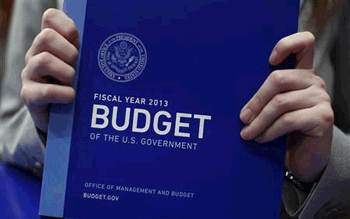PRESIDENT OBAMA CALLS FOR 19% CUT IN ECONOMIC AID TO ARMENIA
Fiscal Year 2013 Budget Maintains Parity in Military Aid Appropriations between Armenia and Azerbaijan
February 13, 2012 WASHINGTON, DC – President Obama has called for a sharp 19% reduction in economic aid to Armenia in the last budget request of his term, reported the Armenian National Committee of America (ANCA).
WASHINGTON, DC – President Obama has called for a sharp 19% reduction in economic aid to Armenia in the last budget request of his term, reported the Armenian National Committee of America (ANCA).
The President has proposed $27,219,000 in Economic Support Fund (ESF) aid for Armenia in his Fiscal Year 2013 (FY13) budget, which is nearly $12,781,000, or 32%, less than the $40,000,000 approved by Congress for FY12. The President’s ESF figures for FY13, however, do not include $2,824,000 in International Narcotics Control and Law Enforcement assistance and 2,500,000 in Global Health Programs (USAID), both categories that were formerly included under the ESF heading. Adding these two line items to the $27,219,000 ESF proposal, brings the economic aid total to Armenia to $32,543,000, which is a sharp 19% cut, measured from FY12 to FY13.
“We are saddened, but not surprised to see that President Obama has once again sought to cut economic aid to Armenia. His Administration has proposed reductions in assistance to Armenia – including this year’s sharp 19% cut – despite the devastating economic impact of dual Turkish and Azerbaijani blockades, and Yerevan’s broad support for U.S.-led missions in Afghanistan, Iraq, and Kosovo, and her cooperation on a broad-range of Washington-inspired regional initiatives – including the reckless Turkey-Armenia Protocols,” said ANCA Executive Director Aram Hamparian. “Sadly, President Obama has chosen to neither keep his commitment to maintain assistance to Armenia, nor taken any meaningful steps to honor his pledge to foster Armenia’s growth and development through expanded trade.”
Regarding military assistance, the Administration’s proposed budget does maintain parity in Foreign Military Finance (FMF) and International Military Education and Training (IMET) to Armenia and Azerbaijan, requesting $2.7 million in FMF and $600,000 for IMET for each country.
The Administration’s budget does not include any figures for aid to Nagorno Karabakh, although, over the past several years USAID has allocated $2,000,000 annually for this purpose. This level of Nagorno Karabakh funding is considerably less than the intent expressed by Congress over the course of many years, reflecting a pattern of under-spending that has left many developmental and confidence-building needs unmet.
The Obama Administration, in addition to consistently seeking reduced aid appropriations for Armenia, has not invited Armenia to submit a second Millennium Challenge Corporation proposal for poverty-reduction programs, nor has it taken any meaningful steps to promote bilateral economic relations, such as negotiations toward a Trade and Investment Framework Agreement, a Double Tax Treaty, or a Free Trade Agreement. During his campaign for the Presidency, Senator Barack Obama promised several times in writing to maintain aid and expand trade with Armenia.
The aid figures being proposed by the President for the Caucasus region are as follows.
|
|
Economic Support Fund |
Foreign Military Financing |
Int’l Military Education & Training |
Int’l Narcotics Control & Law Enforcement |
Global Health Programs – USAID |
|
Armenia |
$27,219,000 |
$2,700,000 |
$600,000 |
$2,824,000 |
$2,500,000 |
|
Azerbaijan |
$11,029,000 |
$2,700,000 |
$600,000 |
$1,226,000 |
— |
|
Georgia: |
$42,660,000 |
$14,400,000 |
$1,800,000 |
$4,000,000 |
$4,000,000 |
Obama Administration Underscores Ties with Turkey
The President’s budget, which features language underscoring the importance that President Obama places on relations with Ankara, proposes $3.6 million in International Military Education and Training for Turkey. The text concerning Turkey reads as follows:
“Turkey continues to play an increasingly important role globally as an emerging power. Turkey is critical to success in the most important U.S. foreign policy priorities, including promoting stability and prosperity in Afghanistan, Pakistan, and Iraq; countering the threat of Iran; encouraging peaceful transition amongst the “Arab Spring” states; achieving a lasting peace in the Middle East; securing European energy diversity and independence; countering global terrorist threats; and advancing economic and trade objectives. The U.S. is working closely with Turkey to advance regional stability in the Eastern Mediterranean by promoting a settlement in Cyprus and encouraging improved relations with Israel; and in the Caucasus by attempting to normalize its relations with Armenia. The U.S. continues to support Turkey’s accession to the EU as an important anchor for Turkish reform and recently concluded an agreement for Turkey to host a U.S. missile defense radar. The U.S. encourages Turkey to make needed reforms, including advancing religious and press freedoms. Although Turkey’s democracy is maturing, challenges remain. Representative democratic institutions have become stronger but continue to face legal and political challenges, including in civilian-military relations. Resolution of the Cyprus conflict would benefit the communities themselves and remove a long source of friction between NATO Allies Greece and Turkey.”